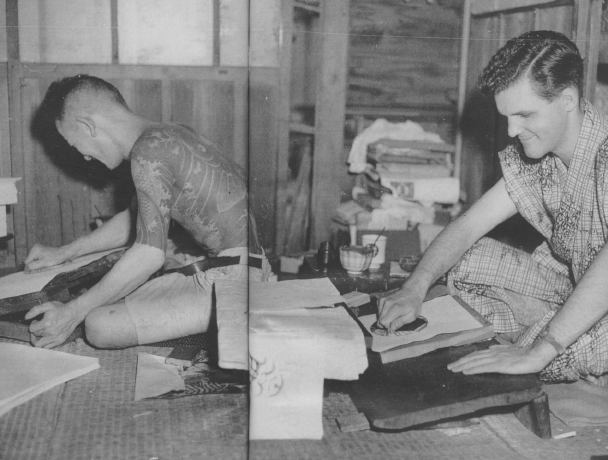1951 Again
Today we're going to continue with the theme established last week, but don't panic - it's not my intention to work my way through all 50 years of that BBC radio series! No, we'll stay a bit longer in 1951.
Listening to that program last week and then writing the story, jogged my memory about a book that I bought some years ago here in Japan. It is a 'special issue' put out by an old and long-running news magazine, and is entitled simply '1951'. It's based on the same concept that we saw in the BBC program: dig through one's archives for a selection of highlights from any given year, and put together a feature publication, although in this case we have photo stories rather than sound clips. Just as the BBC focussed on British events, this magazine has kept to Japanese domestic issues, so there is no overlap between what I heard in one, and what I read in the other.
Both countries were still in the 'recovery' period after a terrible war, although it seems pretty clear that the situation in Japan was far more severe. This country was still under military occupation in 1951, and one of the highlighted stories is the report of General MacArthur's dismissal. There are many stories of strikes and labour unrest, something that seems a bit unreal to me now as I read them. I have been living here for a quarter century, and (to my knowledge) have never encountered any kind of labour disruption at all. Japanese - on strike? It doesn't seem quite real.
There are many pages devoted to various accidents and disasters - train crashes, plane crashes, and some large fires. It's hard to know if such things were more common then than now; I would hope so, but am not sure really.
Most of the rest of the magazine is taken up with items from popular culture: stories about movie stars whose names are completely unfamiliar to me, sports heroes, actors, and the like. Now, all this doesn't really sound all that interesting, and perhaps you are wondering just why David has bothered to bring this up. Is he just trying to fill space today?
Nope! There is a very good reason why I wanted to tell you about this little magazine. When I first looked at it, I too had flipped through the pages in mild interest, but had then come across something that was so 'incredible' that it was difficult to believe at first. But it was true ...
It takes up a two-page spread in the magazine. The main photo shows the interior of a traditional woodblock printmaking workshop. We see a young Japanese printer working in front of a stack of paper, his bare back heavily tattooed, as was quite common in the old days. Nothing strange there, but sitting just behind him, dressed in a summer kimono, printer's baren in hand, pressed to the paper is ... a foreigner. What's this? In 1951, there was a foreigner working in a Japanese printmaking workshop? No way! Surely I would have heard about that before now.
Reading the story cleared up the mystery. The foreigner pictured was Richard Lane, a US scholar who was in Japan studying traditional arts, and who had a specific interest in the old ukiyo-e. He later became a well-known researcher in our field, but this was 'early days' in the country for him, and the story describes how he was living in a small room in the Shitamachi district, studying the language and immersing himself in the local culture.
Did he actually make prints? I had never heard of him being involved in any such endeavour, and looking at the picture it seems pretty clear that it is posed for effect. He is not holding the baren in any way that would actually work, and as both he and the printer are wearing big grins, I guess this was something set up by the magazine photographer.
But there he is, 35 or more years before I ever sat at such a workbench here, and indeed a few months before I was born! And it's especially funny to read in the story exactly the same phrase that magazine writers sometimes use to describe me these days ... 'more Japanese than the Japanese themselves!' (Which is not true, by the way, but that's a story for another time!)
1951 ... an interesting year!

Story #278, April 24 2011
Comments on this story ...



Posted by: Dave
I didn't mention it in the story - and hadn't actually known about it - but Lane died in 2002, after a long career as a scholar. And it was interesting to learn - from this Wikipedia article, that he died intestate and without heirs, so the Japanese authorities had to find a way to 'dispose' of his extensive collection of art.